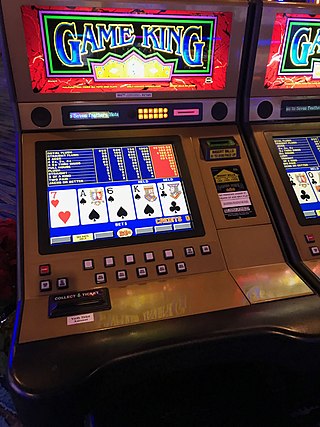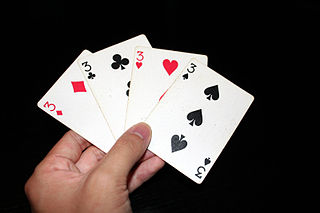A straight flush is a type of poker hand.
Straight flush may also refer to:
- Straight Flush , a B-29 Superfortress
- Straight Flush (book)
- The radar for the 2K12 Kub surface-to-air missile system
A straight flush is a type of poker hand.
Straight flush may also refer to:
Five-card draw is a poker variant that is considered the simplest variant of poker, and is the basis for video poker. As a result, it is often the first variant learned by new players. It is commonly played in home games but rarely played in casino and tournament play. The variant is also offered by some online venues, although it is not as popular as other variants such as seven-card stud and Texas hold 'em.

A wild card in card games is one that may be used to represent any other playing card, sometimes with certain restrictions. These may be jokers, for example in Rummy games, or ordinary ranked and suited cards may be designated as wild cards such as the J♣ and 9♦ in Classic Brag or the "deuces wild" in Poker. A card that is not wild may be referred to as a natural card. Jokers, however, may also have other uses, such as being a permanent top trump.
A poker player is drawing if they have a hand that is incomplete and needs further cards to become valuable. The hand itself is called a draw or drawing hand. For example, in seven-card stud, if four of a player's first five cards are all spades, but the hand is otherwise weak, they are drawing to a flush. In contrast, a made hand already has value and does not necessarily need to draw to win. A made starting hand with no help can lose to an inferior starting hand with a favorable draw. If an opponent has a made hand that will beat the player's draw, then the player is drawing dead; even if they make their desired hand, they will lose. Not only draws benefit from additional cards; many made hands can be improved by catching an out — and may have to in order to win.
In a poker game with more than one betting round, an out is any unseen card that, if drawn, will improve a player's hand to one that is likely to win. Knowing the number of outs a player has is an important part of poker strategy. For example, in draw poker, a hand with four diamonds has nine outs to make a flush: there are 13 diamonds in the deck, and four of them have been seen. If a player has two small pairs, and he believes that it will be necessary for him to make a full house to win, then he has four outs: the two remaining cards of each rank that he holds.

Omaha hold 'em is a community card poker game similar to Texas hold 'em, where each player is dealt four cards and must make their best hand using exactly two of them, plus exactly three of the five community cards. The exact origin of the game is unknown, but casino executive Robert Turner first brought Omaha into a casino setting when he introduced the game to Bill Boyd, who offered it as a game at the Las Vegas Golden Nugget Casino. Omaha uses a 52-card French deck. Omaha hold 'em 8-or-better is the "O" game featured in H.O.R.S.E.
Five-card stud is the earliest form of the card game stud poker, originating during the American Civil War, but is less commonly played today than many other more popular poker games. It is still a popular game in parts of the world, especially in Finland where a specific variant of five-card stud called Sökö is played. The word sökö is also used for checking in Finland.
In poker, the probability of each type of 5-card hand can be computed by calculating the proportion of hands of that type among all possible hands.
Lowball or low poker is a variant of poker in which the normal ranking of hands is inverted. Several variations of lowball poker exist, differing in whether aces are treated as high cards or low cards, and whether straights and flushes are used.
Flushing may refer to:

Video poker is a casino game based on five-card draw poker. It is played on a computerized console similar in size to a slot machine.
Royal Flush may refer to:

Big two is a card game of Cantonese origin. It is similar to the games of winner, daifugō, president, crazy eights, cheat, and other shedding games. The game is very popular in East Asia and in Southeast Asia, especially throughout mainland China, Hong Kong, Vietnam, Macau, Taiwan, Indonesia, the Philippines, Malaysia and Singapore. It is played both casually and as a gambling game. It is usually played with two to four players, the entire deck being dealt out in either case. The objective of the game is to be the first to play off all of one's cards.
Non-standard poker hands are hands which are not recognized by official poker rules but are made by house rules. Non-standard hands usually appear in games using wild cards or bugs. Other terms for nonstandard hands are special hands or freak hands. Because the hands are defined by house rules, the composition and ranking of these hands is subject to variation. Any player participating in a game with non-standard hands should be sure to determine the exact rules of the game before play begins.
Chinese poker is a card game based on poker hand rankings. It is intended as a beginner-friendly game, with only a basic knowledge of poker hand rankings needed to get started. The format allows for frequent unexpected outcomes due to the large element of luck involved, meaning a beginner has a good chance of winning in the short term against even experienced opponents.

Straight Flush was the name of a B-29 Superfortress that participated in the atomic bomb attack on Hiroshima on August 6, 1945.
184 is the natural number following 183 and preceding 185.

Poker dice are dice which, instead of having number pips, have representations of playing cards upon them. Poker dice have six sides, one each of an Ace, King, Queen, Jack, 10, and 9, and are used to form a poker hand.

Marty Smyth is a professional poker player from Belfast, Northern Ireland with a track record including wins in the 2007 Irish Poker Open Championship and the 2008 Poker Million. He won his first WSOP bracelet in the 2008 $10,000 Pot Limit Omaha World Championship.

Carioca is a Chilean card game similar to Rummy style card games with many variations. The variation described below is Perla's Cariocas.